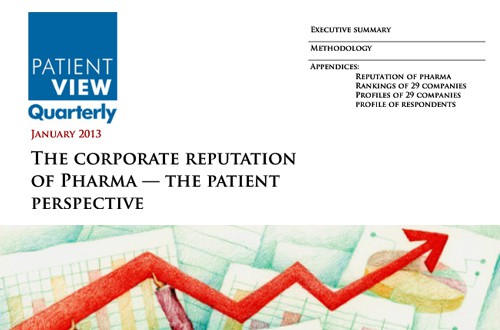
Unfair pricing policies in cash-strapped countries and a lack of transparency have led to a slide in the reputation of the pharma industry, according to a global survey of patient groups.
The PatientView report 2012, which polled 600 patient groups from 56 countries, showed that just 34 per cent of respondents said the industry had at least a ‘good’ reputation, compared to 42 per cent in 2011.
Such figures put the pharma industry sixth out of the seven healthcare industries for reputation, with only for-profit health insurers faring worse in the report, which found that just 24 per cent of patients groups said insurers had a reputation that was ‘good’ or better.
Reasons for pharma’s decline included a lack of fair pricing policies, with patient groups particularly disapproving of industry strategies in such countries as Greece, Portugal and Spain that have led to patients being denied medicines until hospitals pay back their debts.
According to the survey, 50 per cent of patients groups said pharma had a ‘poor’ reputation in this area.
Other areas of discontent for patients groups included transparency of corporate activities, with 48 per cent of respondents saying the industry had a poor reputation.
Issues with pharma’s transparency have particularly been in the spotlight since the publication of Ben Goldacre’s Bad Pharma, which reignited the debate over Roche’s decision not to release full clinical trial data about its influenza medicine Tamiflu despite concerns it is no better than placebo.
However, at the end of the year, the European Medicines Agency (EMA) published a report stating that all clinical data will have to be published, potentially leading to improvements in the area over the coming years if the various disagreements about the best way for this to be done are sorted out.
Areas that reported the steepest fall in terms of pharma reputation were managing adverse news about product (a 29 per cent fall between 2011 and 2012), ethical marketing practices (down 23 per cent), and having a good relationship with the media (down 19 per cent).
Such declines will have been aided by such mammoth legal costs as Johnson & Johnson’s $1.1bn fine for improper marketing of Risperdal (risperidone) and GSK’s $3bn settlement for promoting several drugs in off-label uses.
Lundbeck praised by patient groups
In terms of individual reputation, Lundbeck came top of all the 29 companies examined in the survey, climbing from third place in 2011 when Novartis was judged to have the best reputation.
Of the six parameters companies were measured by, Lundbeck was first in both ‘best at providing high-quality information to patients’ and ‘best at being transparent with external stakeholders’, with a top four placing in three other categories.
Anders Gersel Pedersen, Lundbeck’s executive vice president of R&D, explained why he thought patient groups’ voted his company to have the best reputation.
“We put our words into action by collaborating with patient groups, with whom we try to maintain a dialogue that is both trustworthy and nuanced,” he said.
“I believe that is why we placed third last year, and why we were rated as the best pharmaceutical company overall this year.”




